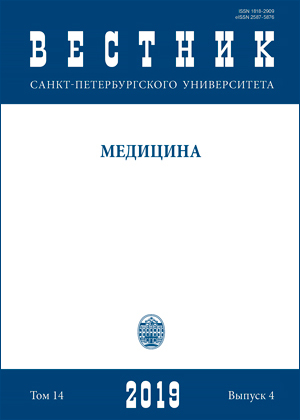Reactions of mice brain to intracerebroventricular injection of thyroid peroxidase antibodies*
DOI:
https://doi.org/10.21638/spbu11.2019.410Abstract
Hashimoto’s encephalopathy is a rare disease of a presumable autoimmune aetiology. It has been shown that patients with this disease have high levels of anti-thyroperoxidase autoantibodies both in blood and cerebrospinal fluid. Specific astrocyte binding of anti-thyroperoxidase autoantibodies suggests a role of these autoantibodies in the Hashimoto’s encephalopathy pathogenesis. In this study the binding of anti thyroperoxidase with various regions of mice brain after intracerebroventricular stereotaxic injection was assessed. The results revealed no specific immunopositive labels in various brain structures of the mice which were subjected to the intracerebroventricular stereotaxic anti-thyroperoxidase injection. Direct application of human polyclonal IgG with high anti-thyroperoxidase titer on brain sections of intact mice demonstrated the same results. Apparently, absence of immunopositive staining in brain structures in the experiment can be explained by single administration of polyclonal IgG which may not contain enough of antibodies with this specificity. Further investigation of anti-thyroperoxidase binding with brain tissue in conditions of repeated intracerebroventricular administration is required.
Keywords:
Hashimoto’s encephalopathy, Hashimoto’s thyroiditis, intracerebroventricular stereotaxic injection, neuroimmune interactions
Downloads
References
References
Downloads
Published
How to Cite
Issue
Section
License
Articles of "Vestnik of Saint Petersburg University. Medicine" are open access distributed under the terms of the License Agreement with Saint Petersburg State University, which permits to the authors unrestricted distribution and self-archiving free of charge.




